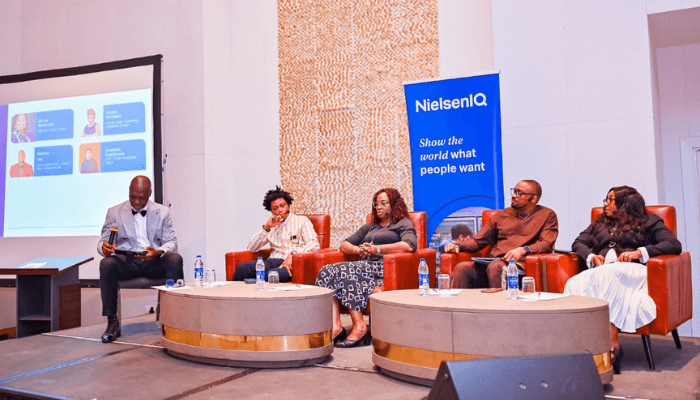Nigerian consumers are increasingly abandoning long-held brand loyalties amid persistent price pressures, with nearly six in ten shoppers switching products in the past year, according to new data from NielsenIQ (NIQ).
The consumer intelligence company revealed the findings at its 3rd Annual Breakfast Conference in Lagos, themed “Tapping into the Upswing.”
The shift underscores a major inflexion point in Nigeria’s fast-moving consumer goods (FMCG) landscape, one shaped by economic recovery, resilient spending, and evolving consumer behaviour. Despite stabilising inflation and a return to modest GDP growth, price sensitivity continues to define the marketplace.
Read also: Gen Z fuels Nigeria’s digital retail revolution, says NielsenIQ
“Almost six in every ten shoppers have switched brands in the past year due to increased prices,” NIQ’s 2025 Consumer Outlook survey found. Toothpaste, cooking oil, and laundry products recorded the highest levels of brand switching, while beverages and personal care categories maintained stronger loyalty.
The report reflects a broader behavioural recalibration among Nigerians who have weathered two years of inflationary turbulence. Although economic conditions have improved, value-seeking behaviour remains dominant.
“The Nigerian consumer is resilient, but pragmatic,” said Faith Wanderi, NIQ’s market leader for East and West Africa. “The conversation is shifting from survival to sustainability. Consumers are looking for quality and value without compromising trust.”
After years of volatility, Nigeria’s FMCG sector is regaining traction. NIQ data shows the industry grew 54.1 percent in value in 2025, up from 34.3 percent the previous year, driven by stronger transactions and increased consumption. While volumes rose modestly by 5.4 percent, the overall value growth points to price resilience and consumers’ willingness to spend selectively.
Wanderi noted that “pricing and unit sales have stabilised, and we’re beginning to see renewed confidence in consumer spending.” The outlook remains positive, with NIQ forecasting continued year-on-year growth in FMCG and beverages through 2027.
Daniel Chobardjian, NIQ’s President for EMEA and India, emphasised during his keynote that the company’s mission is to provide clients with “a Full View™ of the consumer,” enabling them to adapt to the fast-evolving marketplace. “Our innovation and data capabilities are designed to keep businesses ahead of shifting consumer realities,” he said.
Read also: NielsenIQ: Leveraging data to drive growth in Nigeria’s retail sector
While inflationary pressures have eased compared to 2024, consumers remain cautious. The report shows 36 percent of Nigerians still feel financially constrained, down from previous highs. Cost-of-living concerns top the list at 85 percent, followed by fuel prices (63%) and the economic slowdown (66%).
Still, the tone is increasingly optimistic. NIQ’s sentiment data indicates a “gradual rebound in consumer confidence,” with households learning to adapt to persistent macroeconomic challenges.
Wallet allocation continues to favor essentials. Spending on groceries, education, and utilities has risen, while discretionary categories like dining, apparel, and entertainment have seen modest declines.
“The share of spending on essentials such as food, beverages, and transport continues to grow,” said Oluwatosin Onayemi, NIQ’s senior manager for retail measurement services. “We’re seeing a more intentional consumer, one who weighs every purchase decision carefully.”
The report also highlights the acceleration of digital payment adoption, particularly among younger consumers. While cash remains the dominant payment method for 50 percent of Nigerians, mobile wallets and bank transfers are rapidly gaining traction.
Gen Z is leading this digital shift, leveraging mobile-enabled platforms for convenience and speed. Nearly one in four Nigerians now shop online, with e-commerce activity concentrated among Gen Z and Millennials.
This digital fluency is also extending to AI-assisted shopping: 8 percent of Nigerians — mostly younger consumers – use tools like ChatGPT and Gemini to compare prices and discover products. “AI is redefining how consumers engage with brands,” noted Clovis Munsense, NIQ’s Strategic Analytics & Insights Lead for East and West Africa. “Brands that harness precision data and AI-driven insights will better anticipate consumer needs.”
Despite growing price sensitivity, trust remains the cornerstone of purchasing decisions. NIQ’s data reveals that 99 percent of Nigerian consumers consider brand trust “very or somewhat important.” Product quality and consistency are the top trust drivers, followed by customer service and transparent business practices.
In categories such as beverages and personal care, emotional connection continues to shield brands from switching behaviour. “Consumers are willing to pay more for brands that deliver on quality and authenticity,” said Joyce Nwachukwu, associate director for West Africa at NIQ. “Those who compromise consistency risk losing both trust and share.”
Read also: Consumer goods firms adopt innovation strategy to weather economic storm
NIQ’s findings suggest that while consumer pragmatism is here to stay, brands can thrive by innovating around affordability, accessibility, and authenticity.
The company’s “Activate with Precision” framework urges businesses to tailor strategies by region, category, and segment. For example, NIQ’s geographic granularity data shows that just 21 of Nigeria’s 92 “precision areas” account for 50 percent of total soft drink sales, underscoring the value of localised activation.
“Stop averaging your results,” Munsense told attendees. “Growth lies in identifying micro-markets and understanding where real demand resides.”

